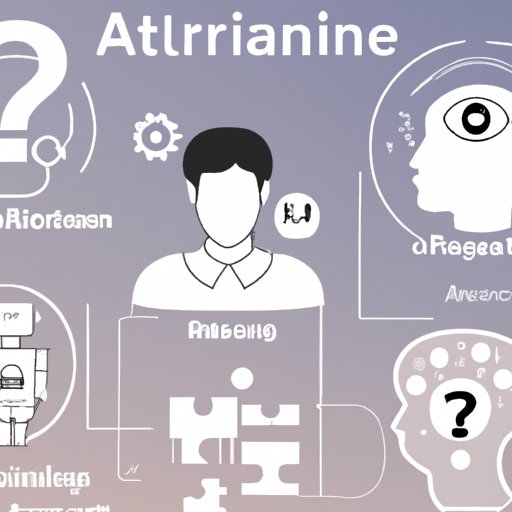Introduction
Artificial intelligence (AI) is defined as “the theory and development of computer systems able to perform tasks that normally require human intelligence, such as visual perception, speech recognition, decision-making, and translation between languages” (Oxford Dictionaries). AI has been widely adopted in various industries, from healthcare to finance, and has become an integral part of our lives. As technology continues to rapidly evolve, it raises many questions and concerns about the implications of AI on society and humanity. In this article, we will explore the potential effects of AI on society, investigate the possibility of AI replacing human tasks, and discuss the fear of AI taking over humanity.
Exploring the Potential Effects of Artificial Intelligence on Society
The introduction of AI into our lives brings both opportunities and risks. As AI technology advances, it is inevitable that it will have a major impact on our lives and society as a whole. Here, we will examine some of the potential effects of AI on society.
Impact on Human Employment
One of the primary concerns regarding AI is its potential to displace human labor. According to a McKinsey Global Institute study, up to 375 million workers worldwide may need to switch occupational categories due to automation by 2030. This could lead to job losses, reduced wages, and increased income inequality. Moreover, the nature of work may change significantly, with machines performing more routine tasks and humans focusing on higher-level cognitive activities. As such, it is important for governments to develop policies that provide support to those affected by automation and create new opportunities for them.
Ethical Questions Raised by AI
The use of AI technology also raises many ethical questions. For instance, who is responsible for the decisions made by autonomous machines? How can we ensure that AI is used responsibly and ethically? How can we prevent AI from being used for malicious purposes? These are all questions that need to be addressed in order to ensure that AI technology is used safely and ethically.
Pros and Cons of AI in Our Lives
Although there are some potential risks associated with AI, there are also many potential benefits. AI has the potential to improve efficiency, reduce costs, and even save lives. For example, AI can be used to diagnose diseases more quickly and accurately than humans, allowing for earlier detection and treatment. AI can also be used to automate mundane tasks, freeing up people’s time and allowing them to focus on more meaningful activities. Ultimately, the pros and cons of AI must be weighed carefully before implementing any AI technology.

Investigating the Possibility of AI Replacing Human Tasks
As AI technology continues to advance, it is becoming increasingly capable of performing complex tasks that were once thought to be impossible for computers. Here, we will explore some of the types of tasks that AI could potentially replace.
Types of Tasks AI Could Replace
AI can already be used to automate a wide range of tasks, from driving cars to analyzing medical images. In the future, AI could potentially be used to replace more complex tasks, such as legal research, financial forecasting, and even creative tasks such as writing and music composition. AI could also be used to augment human capabilities, allowing us to extend our cognitive abilities and solve complex problems more quickly and accurately.
Limitations of AI
Despite its potential to replace human tasks, AI still has its limitations. AI algorithms are only as good as the data they are trained on, and thus are prone to bias and errors. Furthermore, AI algorithms lack the ability to make moral or ethical decisions, which is essential in certain situations. Finally, AI algorithms are often opaque, making it difficult to understand how they arrived at their conclusions.

Discussing the Fear of AI Taking Over Humanity
The fear of AI taking over humanity has been a topic of debate for decades. Here, we will discuss some of the historical examples of technology displacing humans, as well as the potential consequences of AI taking over.
Historical Examples of Technology Displacing Humans
Throughout history, technological advancements have displaced humans from their jobs. For example, the invention of the steam engine led to the displacement of horse-drawn carriages and the rise of the railway industry. Similarly, the invention of the automobile replaced the need for horses and resulted in the displacement of many carriage drivers. These examples illustrate how technology can disrupt the workforce and lead to large-scale job losses.
Potential Consequences of AI Taking Over
If AI were to take over humanity, the consequences could be catastrophic. Machines would be able to outpace humans in every aspect of life, leading to a complete restructuring of society. Additionally, machines would be able to think faster and more efficiently than humans, making them better suited for decision-making roles. This could lead to a world where machines control all aspects of life, leaving humans powerless.
Conclusion
In conclusion, AI has the potential to revolutionize our lives and society, but it also raises many questions and concerns. We have explored some of the potential effects of AI on society, investigated the possibility of AI replacing human tasks, and discussed the fear of AI taking over humanity. While there are many potential benefits to AI, it is important to consider the potential risks and ensure that AI is used responsibly and ethically.
(Note: Is this article not meeting your expectations? Do you have knowledge or insights to share? Unlock new opportunities and expand your reach by joining our authors team. Click Registration to join us and share your expertise with our readers.)
